'We couldn't apply for a BTO': The pains and joys of marrying young in Singapore
As the median age of first marriage in Singapore hovers around 30, a small number of couples are choosing to wed in their early 20s, facing scepticism from family and peers while also finding unexpected rewards.
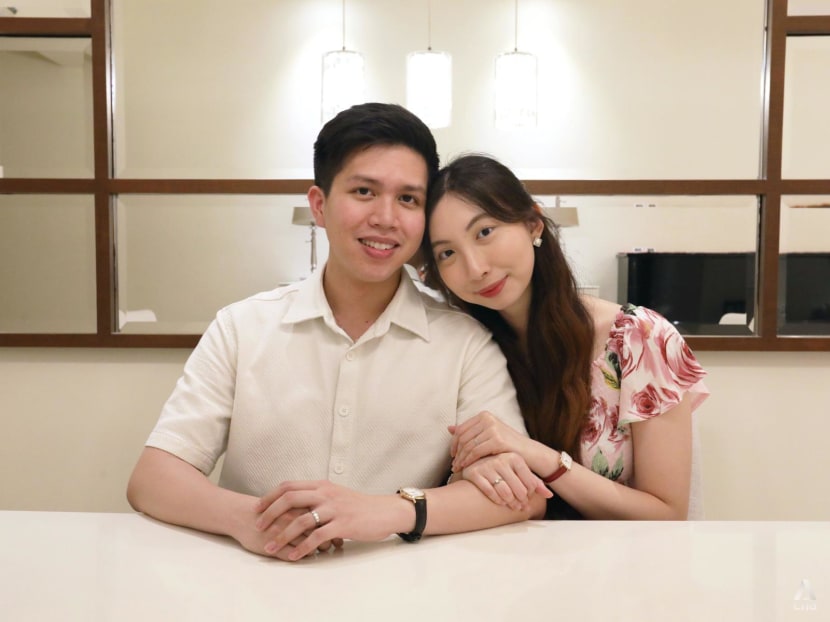
Mr Natthan Lee and Mrs Joye Hannah Lee pictured in their home on Aug 26, 2025. They got married in 2023 when Mr Lee was still a university student. (Photo: CNA/Alyssa Tan)

This audio is generated by an AI tool.
Before she turned 21, marketing executive Nur Dzakiyyah Isaman was already married and sharing a rented studio room with her husband – nearly a decade earlier than the median age of first marriage in Singapore.
When they tied the knot in 2024, she was 20 years old and was three months into a new job, passing probation just in time to claim honeymoon leave.
Her husband Muhammad Danish Hussien was then aged 22 and finishing his final months of National Service as a firefighter.
Though among the earliest in their circle to wed, the couple said they were ready to settle down after two years of dating, guided by their religious values.
However, marrying early came with its set of hitches as well as official procedures to follow. Because of their young age, they had to attend mandatory marriage preparation classes and counselling.
Then, because Ms Dzakiyyah had not turned 21, she was ineligible to apply to own a Housing and Development Board (HDB) flat, since proposed owners must be at least 21 years old. This delayed their hopes of securing a Build-to-Order (BTO) home – a milestone many Singaporeans see as synonymous with marriage.
Still, she called it the "best decision" of her life. "It's different for each couple, of course," she said, "but it's the best feeling to have your best friend at home."
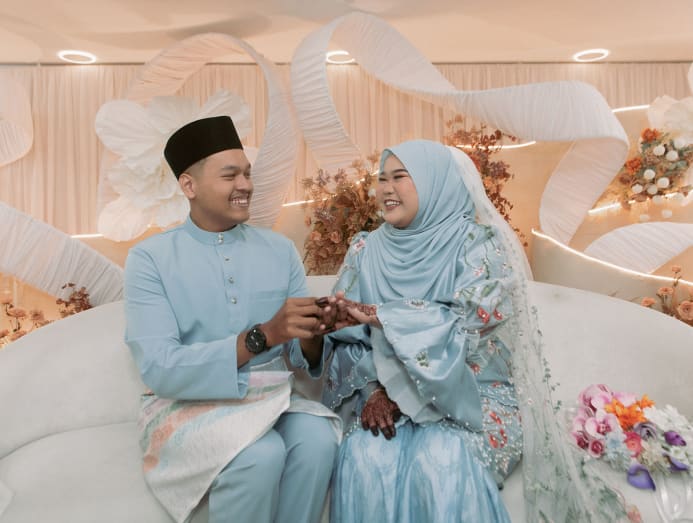
For 23-year-old Chloe Yap, marriage followed naturally after she became pregnant at 20. After all, she had long planned to start a family early and the pregnancy only accelerated those plans.
Ms Yap ended up suffering a miscarriage, but she and her partner maintained no regrets about their decision.
"If I didn't get pregnant … I think we would have dragged on for a very long time before settling down," she said. "By then, we wouldn't have had the energy to grow up with our kids."
Her outlook was shaped by her upbringing as the only child of older parents who had prioritised their careers. Raised largely by her grandmother and a domestic worker, Ms Yap resolved to be fully present for her own future child.
Since giving birth to her first child in June this year, Ms Yap has been a stay-at-home mother. She said she would have few regrets about remaining in this role, because marrying young means she could still return to her career when her daughter – and any subsequent children – are older.
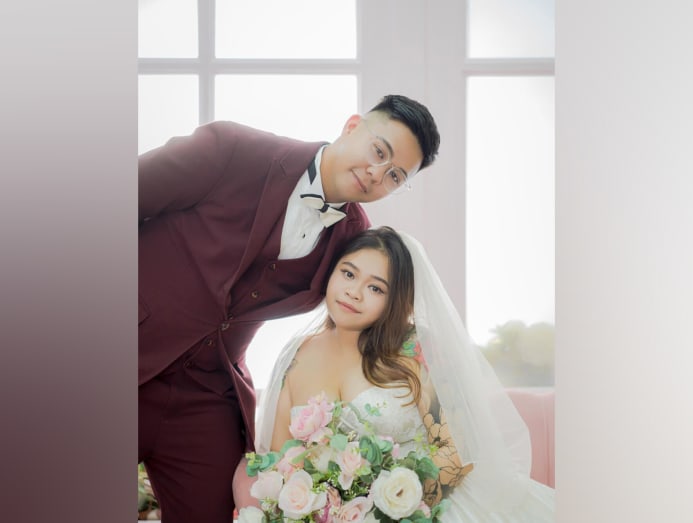
For Natthan and Joye Hannah Lee, marriage was a swift but natural decision.
The couple, now 26 and 25, met at a virtual church camp in June 2021 during the COVID-19 pandemic. Online chats soon turned into group outings, including a cycling trip they both recalled as "love at first sight".
"I remember coming home that day and telling my mum, 'I think he's the one'. Something in me just knew," Mrs Lee, who runs home bakery Joyefulbakes, said.
By April 2022, they were officially dating. By the end of the same year, discussions of marriage were underway.
The memory of the couple's conversation about marriage and potential wedding dates remains fresh in Mrs Lee's mind.
"Natthan whipped out his phone to view his school calendar and there and then, we both agreed on a date together. No overthinking or second thoughts," she said.
They wed on Apr 8, 2023, while Mr Lee was still a university student.
The software engineer said: "We loved being together so much that it didn't make sense to keep saying goodbye at the end of the day. Marriage felt like the most natural way to share more of life together."
These couples are among a small group of Singaporeans bucking a national trend and choosing to wed younger.
A report by the Ministry of Social and Family Development (MSF) released last month showed that the median age at first marriage had continued to climb: grooms from 30.2 years in 2014 to 31.1 in 2024, and brides from 28.2 to 29.6 over the same period.
Conversely, marriages among those aged 24 and below had fallen. Figures from the Department of Statistics (SingStat) showed 995 grooms and 2,110 brides married at that age in 2024 – down from 1,167 and 2,528 respectively in 2020.
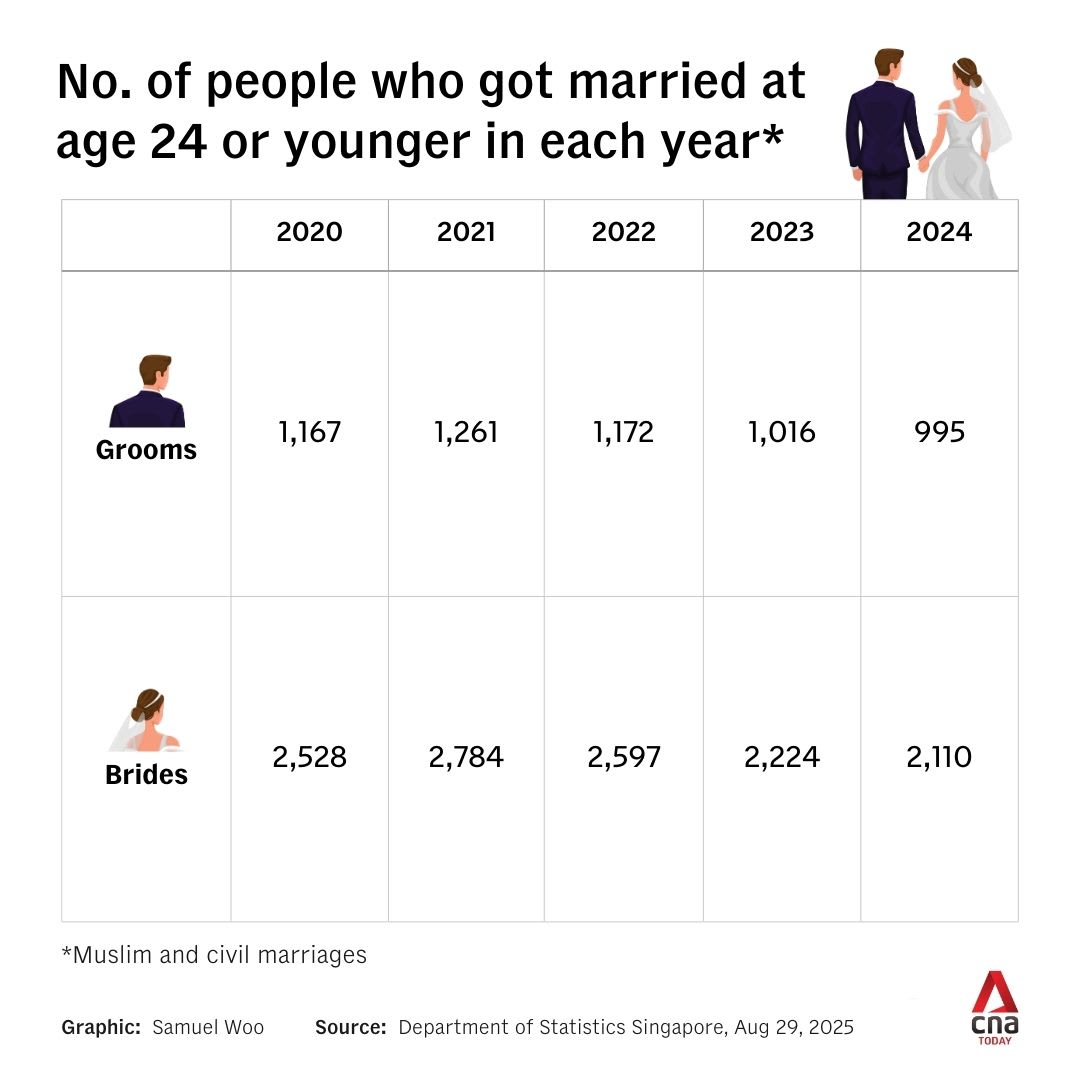
Those who wed young also face extra scrutiny and structural hurdles. Several couples told CNA TODAY that when they announced their unions, reactions often included assumptions of unplanned pregnancies.
"We couldn't apply for a BTO or HDB flat eligibility letter (HFE) after we got married, because the HDB portal said one of the applicants was not above 21 years old, so we were not eligible," Ms Dzakiyyah said.
To support younger pairs, MSF runs the Marriage Preparation Programme for Young Couples, aimed at couples where either party is aged 18 to below 21, or where the groom is 21 to below 25 and the bride is 21 or older.
The programme includes one-to-one consultations, a marriage education workshop in a group setting and post-marriage peer support sessions.
For "minor couples" – where at least one partner is aged 18 to under 21 – completing the consultations and workshop is mandatory before they can file a notice of marriage with the Registry of Marriages.
THE PERKS OF MARRYING YOUNG
Though not without its challenges, marrying young is a path some couples continue to take – and several told CNA TODAY the journey has been uniquely fulfilling.
Some saw marrying young as the key to parenthood.
Student A Thinavarshini, who wed at 20 in 2023, said she and her husband wanted two children and preferred to start early. They now have a two-year-old son and are expecting their second child.
"We wanted to settle down fast and have a family, so we would still be young when our kids are growing up and have the energy to accommodate them," she added.
"People view early marriages as if it's very bad, like we're going to 'spoil' our career and studies. But when you have a supportive family and partner, it's going to be (good), no matter how old you get married."
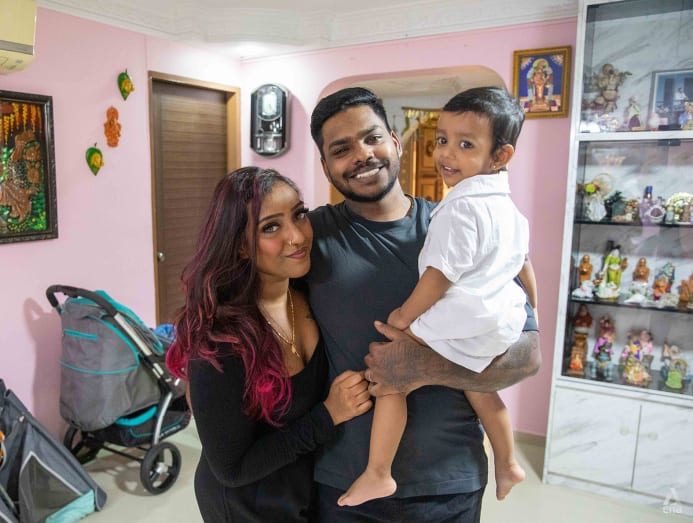
Other couples, including Ms Ho Zhi Hui and her engineer husband Wu Shao Yang, were similarly motivated. After dating for five years, they wed in 2023 when she was 24 and he was 27. They now have a 13-month-old daughter.
Mr Wu said some of his older friends struggled with conception later in life, often becoming a "regret" for several of them.
For Ms Ho, parenting early has had unexpected upsides. Far from hampering her fledgling career as a startup founder, family responsibilities have helped her to mature faster.
"You have to make a lot of decisions that people typically make at 30 plus (years old)," she said. "It has made me better at my work, because I transfer skills like financial planning to work."
She has also learnt to become more efficient at what she does, to carve out more time to take care of her young daughter, whom she sometimes takes along on business trips.
For others for whom parenthood was still a distant prospect, what drew them to marriage early was the emotional fulfilment of committing young – a bedrock they believed would strengthen them for life's challenges ahead.
Mr Lee, the software engineer, said marrying early gave him and his wife space to grow into their relationship without the added pressures of children or major financial commitments.
"There's no rush," he said. "We can focus on each other, build a strong foundation and enjoy the little things in life while we're still young and figuring things out together."
Agreeing, Mrs Lee likened it to training for "facing life as one (unit)". Starting early, she said, has helped them learn to navigate life as a team and better understand each other – a preparation she believes will serve them well for future challenges.

For some couples, marriage also offered stability for them to pursue entrepreneurial ventures.
Mr Chan Kai Yang and Ms Zhuo Jiayi, who run the cake business Cakeinspiration, tied the knot in 2023 when they were both aged 23.
Having worked together in the business before marrying, they said it revealed to them each other's dependability in tough times, strengthening their confidence to wed.
Mr Chan described the couple's view of marriage as a starting point rather than a finish line.
"Some people say you have to get your career and housing (settled first)," he said. "For us, it's about going through the imperfections together."
Ms Joanne Lau, who owns fitness gym S30 Tanjong Pagar with her husband Zhuo Junwei, shared similar sentiments.
The couple, now both 26, unofficially kick-started their media production venture in 2021, taking on production shoots while Ms Lau was still in school.
After marrying in 2022 at 23, they registered their company the next year. They later tripled the business' revenue and opened a photo-video studio of their own.
Earlier this year, they expanded their entrepreneurial undertakings and opened S30 Tanjong Pagar.
She credited their ability to make bold financial decisions to the certainty that marriage brought. In particular, their union enabled them to pool finances and resources, as well as share risks and cement a mutual confidence that they would be in it together for the long haul.
"If we didn't get married earlier, a lot of these business decisions would probably be shelved or wouldn't even happen," Ms Lau said.
MANAGING FINANCES AND STIGMA
No doubt, marriage comes with its share of hard work and the couples who spoke to CNA TODAY acknowledged that marrying young is not without difficulties.
Financial stability was a recurring challenge. Ms Yap recalled that when she married at 21, her husband was still serving National Service, limiting their time together and income.
Ms Ho and Mr Wu also faced overlapping milestones: wedding costs, home renovation and raising a child – all in their early 20s.
"We were young and quite broke, so we planned quite in advance to make sure that our (purchases of) big-ticket items were not too close to each other," Ms Ho said. The couple had begun contributing monthly savings to a joint account while still in university.
The couples also pointed to sacrifices they made for the sake of their union, such as taking temporary pauses on education or careers.
Statistics also point to higher risks. SingStat data showed that couples who wed between 20 and 24 consistently recorded the highest dissolution rates before their 10th anniversary.
Among women in the 2013 resident marriage cohort who married between 20 and 24, almost one in four (24.3 per cent) ended their marriage within a decade. The figure was lower for those who married later – 11.9 per cent for those aged 25 to 29, and 11.2 per cent for those aged 30 to 34.
For men, the rates were even higher. In the 2013 resident marriage cohort, almost three in 10 (29.6 per cent) of those who married between 20 and 24 ended their marriage within 10 years, compared to 13.3 per cent for those aged 25 to 29, and 12.5 per cent for those aged 30 to 34.
Experts said that younger couples may face greater pressures early in marriage, pointing to financial stress and evolving life goals as factors.
Dr Tan Poh Lin, senior research fellow at the Institute of Policy Studies (IPS), said that in Singapore, some younger couples may benefit from housing grants and childcare subsidies that are means-tested.
But she pointed to a 2021 Singapore research paper that shows that marriage and home ownership at a younger age and life stage also comes with its own challenges — lower earning power can also limit such couples' abilities to service housing loans even after subsidies, straining marriages and raising the risk of divorce.
Another unique challenge for couples who choose to marry young is the evolution of their identities as they grow older.
Mr Tony Ong, clinical director of the Counselling and Care Centre, said that for some couples, marrying young could mean giving up opportunities for self-discovery before committing.
He noted that some who married their teenage sweethearts later wondered if they should have allowed themselves more space to explore other relationships and life experiences.
Young couples may also find their values and beliefs diverging over time. Without honest conversations about these differences and how to stay connected despite them, they risk drifting apart, Mr Ong added.
However, experts stressed that age alone does not dictate marital success.
Dr Shannon Ang, an assistant professor of sociology at the Nanyang Technological University (NTU), refuted the misconception that younger marriages are "inherently bad".
He offered a different perspective on the SingStat figures: "Seen another way, 60 to 70 per cent of marriages involving younger grooms and brides do survive beyond the 10th anniversary.
"Among these, I'm sure there are some well-prepared individuals who had everything sorted out financially and relationally for the marriage."
Ms Jean Chen, director at Relationship Matters, which offers therapy and counselling services for couples and families, said that younger couples often have more energy and fewer commitments, giving them more time together.
"This lifestyle is typically different from an older couple in their 40s who have more responsibilities at work, children's studies to monitor and elderly parents to care for," she said.
"When the couple has more time to bond together, it forms a stronger foundation for the marriage."
Given the sometimes bleak outlook on young marriages, interviewees told CNA TODAY they have encountered scepticism from peers and older relatives.
Some of them assumed that it was a "shotgun" wedding, that is, that their decision to wed stemmed from unplanned pregnancies. Others urged them to delay marriage until their careers and finances were stable.
Despite receiving support from her immediate family, Ms Dzakiyyah recalled feeling "underestimated" by extended relatives.
"There was a bit of gossip going around, like, 'Hey, why do you want to get married so young? Do you not want to study, pursue more before you settle down? Do you think marriage is easy?'"
She emphasised that they had put a significant amount of planning into the union and her marriage was far from rushed. The pair fully funded their wedding without loans or parental support, and moved into their own rented studio home shortly after that.
For Ms Zhuo the cake business-owner, family members reminded her that marriage is not to be entered into – or left – lightly.
"But to us, everybody's opinions didn't really matter. We weren't really asking for permission – more like informing and telling them," she said.
"We felt that we had reached a certain level (in our relationship) and we believed we could proceed into this marriage."
MAKING MARRIAGE WORK
Ultimately, young couples acknowledged that while marrying early could come with trade-offs, they were prepared to embrace them. What mattered most, they added, was holding fast to the commitment and keeping communication open and honest.
Many scaled down wedding celebrations, lived with parents temporarily or made other compromises to manage finances.
Ms Yap the stay-at-home mum said: "When you start a family earlier, there are financial issues obviously. If you were to marry later, you would be more financially prepared.
"But that's your battle to choose. Do you want to be financially stable enough to live comfortably but not have the energy? Or would you rather have the energy, with minimal income and finances, and (make the best of) what you have?"
She had miscarried shortly after the marriage solemnisation in April 2023. Though devastating, she said the experience ended up strengthening their bond.
"When I was at my lowest, it showed me what (having) a partner does for you. The miscarriage pulled me and my husband – and even my in-laws – closer."
Others sought advice from older married friends or leaned on parents to mediate sensitive issues with family members, relatives and in-laws. For instance, Ms Lau the gym owner credited her mother in particular for advocating on the couple's behalf to the extended family when they wanted to get their own home or make other financial decisions.
"To us, everybody's opinions didn't really matter. We weren't really asking for permission," Ms Zhuo Jiayi, who wed her husband at 23, says
For some couples, longevity speaks louder than statistics.
Artist Indriana Irawan, 42, and software engineer Abdillah Mohd, 45, who married in their early 20s in 2007, celebrated their 18th anniversary this June.
Ms Indriana recalled joking with her husband about divorce statistics back then: “Our odds were one in two. So every anniversary is, like, 'Hey, we made another year'. And we are so grateful that we've made it this far."
Her advice to young couples: Don’t overcommit financially or feel pressured to achieve the trifecta of a perfect wedding, a new home and a lavish renovation all at once.
After marrying, she and her husband waited two years before buying a home and another eight years before renovating it.
On a broader scale, while marrying young has worked out for some people, sociologists said that a wider shift towards earlier marriages in Singapore remains unlikely in the near future.
Dr Ang from NTU pointed to Singapore's system of "excessively rewarding precocity", where early achievements in school or work bring "outsized" advantages in scholarships, salaries and career progression.
This encourages young people to focus on their education and careers first, he said, while delaying commitments such as marriage or parenthood.
In a system where economic rewards are the chief concern, it is "probably the correct choice to delay any kind of commitment – marriage, parenthood – that may tie you down", he added.
"Unless society can reassure people that they will not get left behind in the dust if they rest for a moment to pursue other things such as family, it is likely that trends towards later marriage and parenthood will continue unabated."
Dr Tan from IPS said that as fewer couples marry young, society has fewer models of successful early unions, making others less confident to take the plunge.
Even so, those who chose this path said they would do it again.
"We're not saying everyone should marry young. It's a decision that needs to be made with clarity," Mrs Lee the home baker said. "For Natthan and me, it felt like we were made for each other and couldn't imagine life any other way.
"If you don't feel that same certainty, there's no need to rush."














